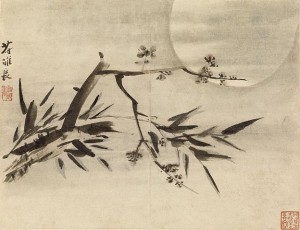The Beauty of Unturned Stones
Natsume Soseki was once an English literature teacher, and a student attempted to render the phrase “I love you” into Japanese.
The scene: a starry, moonlit, romantic night, the man turns to his lover and says, “I love you”. The student plopped the clunky corresponding words, “as-for-me-I love you”, into the translated document.
“No no no,” said Soseki. “You must write this the way a Japanese author would write it: ‘The moon is beautiful tonight.‘”

Here’s an excerpt from an essay by Ryōtarō Shiba, author of Clouds Above the Hill, on this subject.
I’m a big fan of the sayings of Confucius called the Analects. But what would an American think if you had him read this book?
In a book I read a long time ago, someone offered an American scholar a copy of the Analects, and this is what he said:
“It’s like the talk of an Indian chief!”
When I read that book I belted out a deep laugh. This encapsulates the difference between East and West perfectly.
Let’s translate the famous first line from that first paragraph of the Analects as if an Indian chief were saying it.
“You must learn, children, and review what you have read. That is fun, see.”
Suddenly, in the next line, a different topic entirely: “Friends — those are good. Especially, when a friend is coming to visit you from far away. There is nothing as good as that.”
And then another: “Some people get angry when the world fails to acknowledge them. That is no good. Unemotional and calm under pressure — that is what we call character. Got it?”
In the East, the Analects are like a sacred book. This book was mandatory reading in China from the early centuries B.C.E., and when it came to Japan through Korea in the 5th and 6th centuries, it was treasured.
Here we see none of the logic of Aristotle, and none of the piercing rhetoric of the modern West. To put it bluntly, it’s like a a bunch of anecdotes about an old man, and it’s full of unclear sayings, leaps of logic, and blank spaces. The reader has to figure it out for himself, thinking, “Ah, that’s what he’s talking about, right?”
But you can’t figure it out without guessing and filling in the blanks. The Analects is not carefully argued logic but a collection of brief and broken phrases. In every verse, you can only determine 50% of the meaning from what’s actually written there. The other 50% must be figured out by the reader himself. In other words, there is no reading without guessing.
I don’t know whether this is related to the Analects or not, but Japan is full of these brief and broken phrases, not only in reading ancient texts but also in everyday conversation. You don’t rigorously explain everything you’re thinking to the person you talk with, but have them read your intentions, and you read theirs as well.
Japanese people don’t like to argue. Even in the courtroom, laying out cold, precise logic to make your conversation partner fall to his feet and beg for forgiveness invites them to form a grudge, so it can only cause trouble later. So when we negotiate, we speak in brief and broken phrases like an Indian, and add a quiet little smile for breathing room. Someone who can do this well in Japan is said to have character or even worth, but a longtime foreign correspondent once warned me drunkenly over beer, “if you pulled that in America, they’d call you an idiot!”
Fair enough: in Japan, if you attempted to demonstrate the strength of your opinion using endless layers of logic, you’d be the idiot! The listener already understands what you’re trying to prove.
From Amerika Sobyou, 1986
Posted: June 9th, 2013 | Confucius
